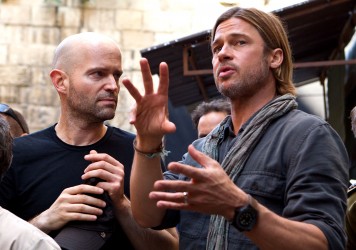A new star rises in Sennia Nanua who plays a preteen zombie who’s still showing signs of life.
In a bed, in a concrete room, a short-haired girl counts aloud, at a carefully measured pace. At 44 precisely, the lights outside come on, and she half-straps herself into a modified wheelchair. She greets cheerily by name the two soldiers, armed, alert and aggressive, who open the door and train their rifles on her. After the soldiers have secured her arms, legs and head tightly to the chair, they wheel her – and a line of similarly restrained children – into a classroom. There, once the soldiers have left, the girl Melanie (extraordinary newcomer Sennia Nanua) persuades the teacher Helen Justineau (Gemma Arterton) to begin the lesson with a story. Melanie particularly likes the myth of Pandora, releasing Plagues from a jar upon mankind but keeping Hope in reserve. Pandora’s name translates roughly from Greek as ‘the girl with all the gifts.’
This prologue leaves little doubt that Melanie corresponds to the girl both of myth and of the film’s title. Not only is she the focal point of Mike Carey’s screenplay (unlike in his 2014 novel of the same name, which divided its narrative point-of-view between several principal characters), but she is also clearly special, brighter and more talkative than her sluggish peers, and, for all her sweetness, regarded by the adults as a potential source of danger and destruction – a Pandora in waiting.
The film takes its time letting us know exactly why she is a threat, at first unfolding an intriguing scenario, akin to the one in Mark Romanek’s Never Let Me Go, in which children are shown receiving a strange schooling, and mysteriously disappearing never to be seen again. No doubt this has something to do with Dr Caroline Caldwell (Glenn Close), whose close interest in the children comes with a chillingly clinical detachment. Meanwhile, Sergeant Eddie Parks (Paddy Considine), in charge of the soldiers, openly refers to the children as “friggin’ abortions.” Only Justineau treats Melanie as a human being, and affords her the protection that children conventionally attract.
Melanie will eventually leave this underground compound, and when she does she will see for the first time – and we with her – the diseased world, no longer quite like our own, into which she has been perversely born. As Parks, Justineau, Caldwell, Melanie and the foot soldier Kieran Gallagher (Fisayo Akinado) form a travelling unit through a dying – or is it transforming? – England, Melanie gradually shifts from being their captive to their repeated saviour. Hope – of survival, of continuity, of adaptation – remains, even as the group’s setbacks mushroom, but Caldwell’s vision of the future is incompatible with Melanie’s, and a life-or-death choice must be made.
“I’ve never met a good person or a bad person,” the gruff Parks tells Justineau at one point. “You just do what you have to do.” This principle is observed throughout The Girl with All The Gifts. For the film steadfastly refuses to demonise any of its characters, instead sympathising with all their conflicting positions. It is this moral complexity, ultimately, which sends the film towering above its generic foundations. For here, much as in his 2010 feature debut Outcast, director Colm McCarthy is taking a very familiar kind of movie monster in bold and unusual directions – and although the specific form of the zombie-like infected may be recognisable to anyone who has played 2013’s The Last of Us, the film also thankfully shares that video game’s preferred focus on character and human nature over the mere mechanics of horror.
While the adults here may be reluctant to pass on their world to a younger, very different generation, the irony is that nearly everything Melanie does in this film is learnt behaviour, mirroring the conduct of her elders – with her own wilder instincts either suppressed or diverted into healthier channels. This is an allegory of adolescence – that eternal clash between clinging to your roots and breaking free – in a rapidly evolving and often hostile world. The Girl with All the Gifts looks forward to the future with one eye, while ruefully casting the other back on a past forever contained and sealed off – like Hope in Pandora’s jar.
Published 21 Sep 2016
Loved Colm McCarthy’s first film, Outcast.
A genre film that favours characterisation and morality over mayhem (but gets the mayhem right too).
The horrifying beauty of change, from the mutant’s perspective.

By Chris Rogers
The zombie pandemic thriller heralds the end of the world as we know it. Again. It’s time to scramble into the bunker and lock the door.

How come there are no people in the world of this new James Bond movie?